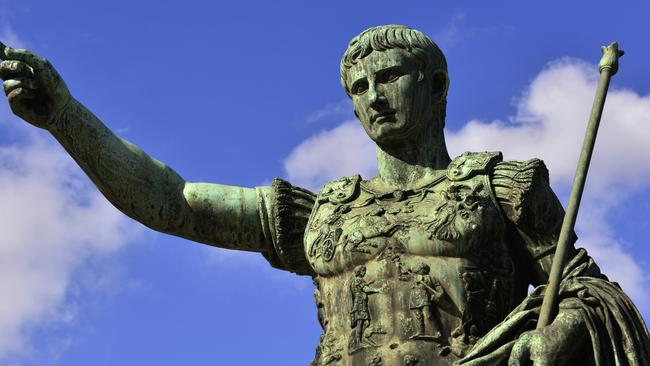Joe Hildebrand: Israel, Hamas war, conflict in Ukraine and votes like the Voice give a lesson in history
Whether it’s Russia’s claim of historical right to occupy Ukraine or Israel and Palestine’s claims to the most hotly contested piece of land over the past three millennia, history is tearing humanity apart, writes Joe Hildebrand
Opinion
Don't miss out on the headlines from Opinion. Followed categories will be added to My News.
I am obsessed with history: the stories, the lessons, the losses. History is what it
says it is: the story of humanity.
And the reason I love it so much is that nothing else makes me feel so connected to my fellow human beings.
But it doesn’t look like history is connecting us much right now.
Whether it’s Russia’s claim of its historical right to occupy Ukraine or Israel and Palestine’s claims to the most hotly contested piece of land over the past three millennia, history is tearing humanity apart.
We have wars being waged on the basis of historical rights and wrongs and we
even just had a referendum in Australia that put history into the future tense, with calls for citizens not to be “on the wrong side of history”.
And it is within that most tediously overused activist cliché that the truth of the matter
unwittingly lies.

Because while history may be many things, one thing it is definitely not is the past.
This is a fact that had not remotely formed in my mind until I heard a historian say it. In fact, he said, history and the past were two completely different things, often unrelated or at direct odds to one another.
The past is everything that has happened, whether we know it or not. History is the story we tell about the past, whether true or not.
Sometimes it’s propaganda or puff-piece hagiography and sometimes it’s incredibly strong and scholarly and sensible work. Sometimes it’s an arrowhead from which we try to deduce the life story of the skeleton lying next to it — although history and archaeology are also two different things.

And so when people talk about being “on the wrong side of history”, they’re not talking
about being on the wrong side of what actually happened — anti-Voice voters were clearly
on the right side of that — but that future generations will disapprove of them.
Point being, history is not something that happened long ago. History is something that is
done in the present — be it the present in which the Ancient Greek “father of history”
Herodotus is telling us about the even more ancient Egyptians in the 5th century BC or the
stories we are telling ourselves now.
And so why does this matter? Isn’t it all just semantics?
Probably not to the thousands dead in Israel, Gaza and Ukraine who have all been sent to
meet their respective makers in history’s name.
Because it is in history’s name that such wars are started and fought and in whose name
that innocent people die for what is often no reason in the present.
But just take the word “history” or “historical” in any of these conflicts and simply replace it with “past”. Suddenly the folly becomes clear.
If you claim a historical right to a piece of land or hold on power the clear implication is that the right is yours in perpetuity, because the history that is being told clearly confers upon you that right.


By contrast if you were to claim a past right it makes it equally clear that this is merely a
longing for something you once had but lost. Incidentally the Romans had a magnificently
specific word for this: desiderium.
More pertinently, it was the Romans who expelled the Israelites from Jerusalem in the 1st
century AD after yet another uprising, razing the Temple, rebuilding the city and renaming
the province Palestine.
Previously the Jews had also been expelled and enslaved by the Babylonians and the
Egyptians before finding their way back to the Promised Land.
A few centuries after the Roman rout the lands were taken by the armies of Mohammad
and his successors, who swept through the Eastern Mediterranean and North African
worlds, flipping them from Christian to Muslim, and later the Ottomans finished the job by conquering the Orthodox Byzantine Empire once and for all.
And in between those two seismic shifts the Western Christian crusaders came and caused
outrageous bloody carnage in the Middle East, both conquering and later losing Jerusalem
and also shamefully attacking their fellow Christians of Constantinople.

More latterly one could point to the declining Ottoman Empire’s decision to side with the
deranged German Kaiser Wilhelm II in the First World War, thus leading to the British
Mandate which ultimately enabled the modern state of Israel to exist after the greatest
planned genocide in human history.
And so the question of who has the right to rule and inhabit these holiest and most historic
of places is a patently absurd one.

The historical right depends only on who is writing the
history while the past simply depends on who had the biggest guns.
The inescapable truth is that the past is the past. It is done and cannot be undone. All that
matters is where we are now.
The problem is we have two sides in Israel and Palestine who not only cannot agree on the
past but cannot agree on the present.
Hamas, along with other extreme Islamist groups, does not acknowledge Israel’s right to
exist.

That makes it impossible for Israel to negotiate a two-state solution.
Their utterly inhuman actions on October 7 only prove beyond doubt that no peace can be negotiated while they are in charge.
However Palestinian leaders also find it all but impossible to deal with Israel in good faith
while it allows or encourages its citizens to settle and encroach on Palestinian lands.
This terribly undermines the moral authority of a nation that holds itself as a bastion of
democracy and reason in the Middle East.
And so while both sides point to history for both legitimacy and grievance it is the here and
now that is holding them back.
They would do better to leave their differences in the past and chart a new course starting in the present.





